
All pictures of the Labours of Hercules on this page are from the Livius website and were made by Marco Prins and Jona Lendering. They come from the sarcophagus from Perge that is now at the archaeological museum of Alanya.
See:The Twelve Labours of Hercules, Son of Jupiter & Alcmena
HERACLES
and in Latin HERCULES, the most celebrated of all the heroes of antiquity. The traditions about him are not only the richest in substance, but also the most widely spread for we find them not only in all the countries round the Mediterranean, but his wondrous deeds were known in the most distant countries of the ancient world.
The difficulty of presenting a complete view of these traditions was felt even by the ancients and in order to give a general survey, we must divide the subject, mentioning first the Greek legends and their gradual development, next the Roman legends, and lastly those of the East (Egypt, Phoenicia).
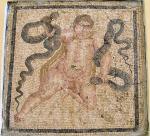
As Hera was always hostile to the offspring of her husband by mortal mothers, she sent two serpents to destroy him as he lay in his cradle, but the precocious infant strangled them with his own hands.
The traditions about Heracles appear in their national purity down to the time of Herodotus for although there may be some foreign ingredients, yet the whole character of the hero, his armour, his exploits, and the scenes of his action, are all essentially Greek. But the poets of the time of Herodotus and of the subsequent periods introduced considerable alterations, which were probably derived from the east or Egypt, for every nation of antiquity as well as of modern times had or has some traditions of heroes of superhuman strength and power. Now while in the earliest Greek legends Heracles is a purely human hero, as the conqueror of men and cities, he afterwards appears as the subduer of monstrous animals, and is connected in a variety of ways with astronomical phenomena.
According to Homer Heracles was the son of Zeus by Alcmene of Thebes in Boeotia, and the favourite of his father. His stepfather was Amphitryon. Amphitryon was the son of Alcaeus, the son of Perseus, and Alcmene was a granddaughter of Perseus. Hence Heracles belonged to the family of Perseus.
The story of his birth runs thus. Amphitryon, after having slain Electryon, was expelled from Argos, and went with his wife Alcmene to Thebes, where he was received and purified by his uncle Creon. Alcmene was yet a maiden, in accordance with a vow which Amphitryon had been obliged to make to Electryon, and Alcmene continued to refuse him the rights of a husband, until he should have avenged the death of her brothers on the Taphians.
While Amphitryon was absent from Thebes, Zeus one night, to which he gave the duration of three other nights, visited Alcmene, and assuming the appearance of Amphitryon, and relating to her how her brothers had been avenged, he begot by her the hero Heracles, the great bulwark of gods and men.
The day on which Heracles was to be born, Zeus boasted of his becoming the father of a man who was to rule over the heroic race of Perseus. Hera prevailed upon him to confirm by an oath that the descendant of Perseus born that day should be the ruler. When this was done she hastened to Argos, and there caused the wife of Sthenelus to give birth to Eurystheus, whereas, by keeping away the Eileithyiae, she delayed the confinement of Alcmene, and thus robbed Heracles of the empire which Zeus had intended for him.
Zeus was enraged at the imposition practised upon him, but could not violate his oath. Alcmene brought into the world two boys, Heracles, the son of Zeus, and Iphicles, the son of Amphitryon, who was one night younger than Heracles.
Zeus, in his desire not to leave Heracles the victim of Hera's jealousy, made her promise, that if Heracles executed twelve great works in the service of Eurystheus, he should become immortal.
Respecting the place of his birth traditions did not agree for although the majority of poets and mythographers relate that he was born at Thebes, Diodorus says that Amphitryon was not expelled from Tiryns till after the birth of Heracles, and Euripides describes Argos as the native country of the hero.
Nearty all the stories about the childhood and youth of Heracles, down to the time when he entered the service of Eurystheus, seem to be inventions of a later age: at least in the Homeric poems and in Hesiod we only find the general remarks that he grew strong in body and mind, that in the confidence in his own power he defied even the immortal gods, and wounded Hera and Ares, and that under the protection of Zeus and Athena he escaped the dangers which Hera prepared for him. But according to Pindar, and other subsequent writers, Heracles was only a few months old when Hera sent two serpents into the apartment where Heracles and his brother Iphicles were sleeping, but the former killed the serpents with his own hands.
Heracles was brought up at Thebes, but the detail of his Infant life is again related with various modifications in the different traditions.
It is said that Alcmene, from fear of Hera, exposed her son in a field near Thebes, hence called the field of Heracles here he was found by Hera and Athena, and the former was prevailed upon by the latter to put him to her breast, and she then carried him back to his mother.
Others said that Hermes carried the newly-born child to Olympus, and put him to the breast of Hera while she was asleep, but as she awoke, she pushed him away, and the milk thus spilled produced the Milky Way.
As the hero grew up, he was instructed by Amphitryon in riding in a chariot, by Autolycus in wrestling, by Eurytus in archery, by Castor in fighting with heavy armour, and by Linus in singing and playing the lyre.
Linus was killed by his pupil with the lyre, because he had censured him. Being charged with murder, Heracles exculpated himself by saying that the deed was done in self-defence and Amphitryon, in order to prevent similar occurrences, sent him to attend to his cattle. In this manner he spent his life till his eighteenth year.
His height was four cubits, fire beamed from his eyes, and he never wearied in practising shooting and hurling his javelin. Pindar calls him small of stature, but of indomitable courage. His first great adventure, which happened while he was still watching the oxen of his father, is his fight against and victory over the lion of Cythaeron.
This animal made great havoc among the flocks of Amphitryon and Thespius (or Thestius), king of Thespiae, and Heracles promised to deliver the country of the monster. Thespius, who had fifty daughters, rewarded Heracles by making him his guest so long as the chase lasted, and gave up his daughters to him, each for one night. Heracles slew the lion, and henceforth wore its skin as his ordinary garment, and its mouth and head as his helmet others related that the lion's skin of Heracles was taken from the Nemean lion.
On his return to Thebes, he met the envoys of king Erginus of Orchomenos, who were going to fetch the annual tribute of cine hundred oxen, which they had compelled the Thebans to pay. Heracles, in his patriotic indignation, cut off the noses and ears of the envoys, and thus sent them back to Erginus. The latter thereupon marched against Thebes but Heracles, who received a suit of armour from Athena, defeated and killed the enemy, and compelled the Orchomenians to pay double the tribute which they had formerly received from the Thebans.
In this battle against Erginus Heracles lost his father Amphitryon, though the tragedians make him survive the campaign. According to some accounts, Erginus did not fall in the battle, but concluded peace with Heracles. But the glorious manner in which Heracles had delivered his country procured him immortal fame among the Thebans, and Creon rewarded him with the hand of his eldest daughter, Megara, by whom he became the father of several children, the number and names of whom are stated differently by the different writers.
The gods, on. the other hand, made him presents of arms: Hermes gave him a sword, Apollo a bow and arrows, Hephaestus a golden coat of mail, and Athena a peplus, and he cut for himself a club in the neighbourhood of Nemea, while, according to others, the club was of brass, and the gift of Hephaestu.
After the battle with the Minyans, Hera visited Heracles with madness, in which he killed his own children by Megara and two of Iphicles. In his grief he sentenced himself to exile, and went to Thestius who purified him.
Other traditions place this madness at a later time, and relate the circumstances differently. He then consulted the oracle of Delphi as to where he should settle. The Pythia first called him by the name of Heracles — for hitherto his name had been Alcides or Alcaeus, and ordered him to live at Tiryns, to serve Eurystheus for the space of twelve years, after which he should become inmortal. Heracles accordingly went to Tiryns, and did as he was bid by Eurystheus.
The accounts of the twelve labours of Heracles are found only in the later writers, for Homer and Hesiod do not mention them. Homer only knows that Heracles during his life on earth was exposed to infinite dangers and sufferings through the hatred of Hera, that he was subject to Eurystheus, who imposed upon him many and difficult tasks, but Homer mentions only one, viz. that he was ordered to bring Cerberus from the lower world.
The Iliad further alludes to his fight with a sea-monster, and his expedition to Troy, to fetch the horses which Laomedon had refused him.
On his return from Troy, he was cast, through the influence of Hera, on the coast of Cos, but Zeus punished Hera, and carried Heracles safely to Argos.
Afterwards Heracles made war against the Pylians, and destroyed the whole family of their king Neleus, with the exception of Nestor. He destroyed many towns, and carried off Asty-oche from Ephyra, by whom he became the father of Tlepolemus.
Hesiod mentions several of the feats of Heracles distinctly, but knows nothing of their number twelve. The selection of these twelve from the great number of feats ascribed to Heracles is probably the work of the Alexandrines. They are enumerated in Euripides, Apollodorus, Diodorus Siculus, and the Greek Anthology, though none of them can be considered to have arranged them in any thing like a chronological order.
The lion of Nemea
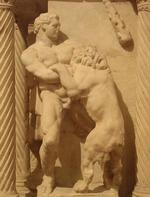
The lion of Nemea
1. The fight with the Nemean lion. The mountain valley of Nemea, between Cleonae and Phlius, was inhabited by a lion, the offspring of Typhon and Echidna. (The Theogony of Hesiod 327) Eiirystheus ordered Heracles to bring him the skin of this monster.
When Heracles arrived at Cleonae, he was hospitably received by a poor man called Molorchus. This man was on the point of offering up a sacrifice, but Heracles persuaded him to delay it for thirty days until he should return from his fight with the lion, in order that then they might together offer sacrifices to Zeus Soter but Heracles added, that if he himself should not return, the man should offer a sacrifice to him as a hero.
The thirty days passed away, and as Heracles did not return, Molorchus made preparations for the heroic sacrifice but at that moment Heracles arrived in triumph over the monster, which was slain, and both sacrificed to Zeus Soter. Heracles, after having in vain used his club and arrows against the lion, had blocked up one of the entrances to the den, and entering by the other, he strangled the animal with his own hands. According to Theocritus (xxv. 251), the contest did not take place in the den, but in the open air, and Heracles is said to have lost a finger in the struggle.
He returned to Eurystheus carrying the dead lion on his shoulders and Eurystheus, frightened at the gigantic strength of the hero, took to flight, and ordered him in future to deliver the account of his exploits outside the gates of the town.
The Hydra
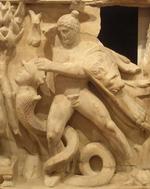
The Hydra
2. Fight against the Lernean hydra. This monster, like the lion, was the offspring of Typhon and Echidna, and was brought up by Hera.
It ravaged the country of Lernae near Argos, and dwelt in a swamp near the well of Arnymone: it was formidable by its nine heads, the middle of which was immortal. Heracles, with 'burning arrows, hunted up the monster, and with his club or a sickle he cut off its heads but in the place of the head he cut off, two new ones grew forth each time, and a gigantic crab came to the assistance of the hydra, and wounded Heracles.
However, with the assistance of his faithful servant lolaus, he burned away the heads of the hydra, and buried the ninth or immortal one under a huge rock.
Having thus conquered the monster, he poisoned his arrows with its bile, whence the wounds inflicted by them became incurable.
Eurystheus declared the victory unlawful, as Heracles had won it with the aid of lolaus. (Hes. Theog. 313, Ov. Met. ix.)
The Stag
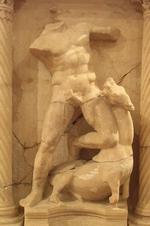
The Stag
3. The stag of Ceryneia in Arcadia. This animal had golden antlers and brazen feet. It had been dedicated to Artemis by the nymph Taygete, because the goddess had saved her from the pursuit of Zeus.Heracles was ordered to bring the animal alive to Mycenae. He pursued it in vain for a whole year: at length it fled from Oenoe to mount Artemisiurn in Argolis, and thence to the river Ladon in Arcadia.
Heracles wounded it with an arrow, caught it, and carried it away on his shoulders. While yet in Arcadia, he was met by Apollo and Artemis, who were angry with him for having outraged the animal sacred to Artemis but Heracles succeeded in soothing their anger, and carried his prey to Mycenae.
According to Borne statements, he killed the stag.
4. The Erymanthian boar. This animal, which Heracles was ordered to bring alive, had descended from mount Erymanthtis (according to others, from mount Lampe,) into Psophis. Heracles chased him through the deep snow, and having thus worn him out, he caught him in a net, and carried him to Mycenae. (Apollod. ii, 5. § 4 Diod. iv. 12.) Other traditions place the hunt of the Erymanthian boar in Thessaly, and some even in Phrygia.
The Boar
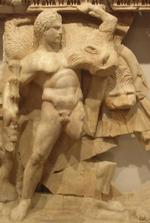
The Boar
It must be observed that this and subsequent labours of Heracles are connected with other subordinate ones, called Ilapepya, and the first of these parerga is the fight of Heracles with the Centaurs for it is said that in his pursuit of the boar he came to the centaur Pholus, who had received from Dionysus a cask of excellent wine. Heracles opened ' it, contrary to the wish of his host, and the delicious fragrance attracted the other centaurs, wha besieged the grotto of Pholus.
Heracles drove them away: they fled to the house of Cheiron, and Heracles, eager in his pursuit, wounded Cheiron, his old friend. Heracles was deeply grieved, and tried to save Cheiron but in vain, for the wound was fatal.
As, however, Cheiron was immortal, and could not die, he prayed to Zeus to take away his immortality, and give it to Prometheus. Thus Cheiron was delivered of his burning pain, and died. Pholus, too, was wounded by one of the arrows, which by accident fell on his foot and killed him.
This fight with the centaurs gave rise to the esta* blishment of mysteries, by which Demeter intended to purify the hero from the blood be had shed against his own will.
The Stables
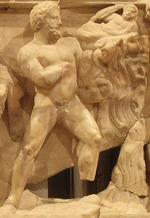
The Stables
5. The stables of Augeas. Eurystheus imposed upon Heracles the task of cleaning the stables of Augeas in one day. Augeas was king of Elis, and extremely rich in cattle. Heracles, without mentioning the command of Eurystheus, went to Augeas, offering in one day to clean his stables, if he would give him the tenth part of the cattle for his trouble, or, according to Pausanias (v. i. § 7) a part of his territory. Augeas, believing that Heracles could not possibly accomplish what he promised, agreed, and Heracles took Phyleus, the son of Augeas, as his witness, and then led the rivers Alpheius and Peneius through the stables, which were thus cleaned in the time fixed upon.
But Augeas, who learned that Heracles had undertaken the work by the command of Eurystheus, refused the reward, denied his promise, and declared that he would have the matter decided by a judicial verdict. Phyleus then bore witness against his father, who exiled him from Elis. Eurystheus declared the work thus performed to be unlawful, because Heracles had stipulated with Augeas a payment for it.
At a subsequent time Heracles, to revenge the faithlessness of Augeas, marched with an army of Argives and Tirynthians against Augeas, but in a narrow defile in Elis he was taken by surprise by Cteatus and Eurytus, and lost a great number of his warriors. But afterwards. Heracles slew Cteatus and Eurytus, invaded Elis, and killed Augeas and his sons. After this victory, Heracles marked out the sacred ground on which the Olympian games were to be celebrated, built altars, and instituted the Olympian festival and games.
The Birds
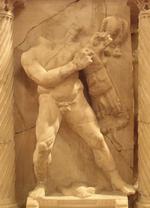
The Birds
6. The Stymphalian birds. They
were an innumerable swarm of voracious birds, the daughters of
Stymphalus and Ornis. They had
brazen claws, wings, and beaks, used their feathers as arrows,
and ate human flesh.
They had been brought up by Ares, and were so numerous, that with their secretions and feathers they killed men and beasts, and covered whole fields and meadows.
From fear of the wolves, these birds had taken refuge in a lake near Stymphalus, from which Heracles was ordered by Eurystheus to expel them.
When Heracles undertook the task, Athena provided him with a
brazen rattle, by the noise of which he startled the birds, and,
as they attempted to fly away, he killed them with his
arrows.
According to some accounts, he did not kill the birds, but
only drove them away, and afterwards they appeared again in the
island of Aretias, whither they had fled, and where they were
found by the Argonauts.
7. The Cretan Bull. According to Acusilaus, this bull was the same as the one which had carried Europa across the sea according to others, he had been sent out of the sea by Poseidon, that Minos might sacrifice him to the god of the sea.
Cretan bull
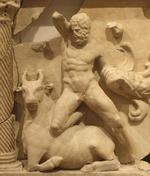
Cretan bull
But Minos was so charmed with the beauty of the animal, that he kept it, and sacrificed another in its stead, Poseidon punished Minos, by making the fine bull mad, and causing it to make great havoc in the island. Heracles was ordered by Eurystheus to catch the bull, and Minos, of course, willingly allowed him to do so.
Heracles accomplished the task, and brought the bull home on his shoulders, but he then set the animal free again.
The bull now roamed about through Greece, and at last came to Marathon, where we meet it again in the stories of Theseus.
8. The mares of the Thracian Diomedes. This Diomedes, king of the Bistones in Thrace, fed his horses with human flesh, and Eurystheus now ordered Heracles to fetch those animals to Mycenae. For this purpose, the hero took with him some companions.
The Horses
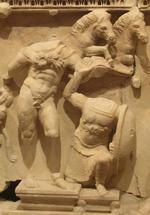
The Horses
He made an unexpected attack on those who guarded the horses in their stables, took the animals, and conducted them to the sea coast. But here he was overtaken by the Bistones, and during the ensuing fight he entrusted the mares to his friend Abderus, a son of Hermes of Opus, who was eaten up by them but Heracles defeated the Bistones, killed Diomedes, whose body he threw before the mares, built the town of Abdera, in honour of his unfortunate friend, and then returned to Mycenae, with the horses which had become tame after eating the flesh of their master.
The horses were afterwards set free, and destroyed on Mount Olympus by wild beasts.
9. The girdle of the queen of the Amazons. Hippolyte, the queen of the Amazons, (Diodorus calls the queen Melanippe, and her sister Hippolyte), possessed a girdle, which she had received from Ares, and Admete, the daughter of Eurystheus, wished to have it.
Heracles was therefore sent to fetch it, and, accompanied by a number of volunteers, he sailed out in one vessel. He first landed in Paros, where he became involved in a quarrel with the sons of Minos. Having killed two of them, he sailed to Mysia, where his aid was solicited by Lycus, king of the Mariandynians, against the Bebryces.
The Girdle
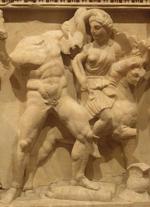
The Girdle
Heracles assisted Lycus, took a district of land from the enemy, which was given to Lycus, who called it Heracleia. When Heracles at length arrived in the port of Themiscyra (Thermodon), after having given to the sea he had crossed the name of Euxeinus, he was at first kindly received by Hippolyte, who promised him her girdle. But Hera, in the disguise of an Amazon, spread the report that the queen of the Amazons was robbed by a stranger.
They immediately rose to her assistance, and Heracles, believing that the queen had plotted against him, killed her, took her girdle, and carried it with him. This expedition, which led the hero into distant countries, afforded a favourable opportunity to poets and mythographers for intruducing various embellishments and minor adventures, such as the murder of the Boreades, Calais and Zetes, and his amour with Echidna, in the country of the Hyperboreans, by whom he became the father of three sons.
On his return he landed in Troas, where he rescued Hesione from the monster sent against her by Poseidon, in return for which her father Laomedon promised him the horses he had received from Zeus as a compensation for Ganymedes. But, as Laomedon did not keep his word, Heracles on leaving threatened to make war against Troy. He therefore landed in Thrace, where he slew Sarpedon, and at length he returned through Macedonia to. Peloponnesus.
10, The oxen of Geryones in Erytheia. The fetching of these oxen was a subject which, like the preceding one, was capable of great poetical embellishments, owing to the distant regions into which it carried the hero.
Geryoneus
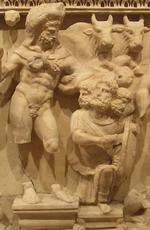
Geryoneus
The adventure is mentioned by Hesiod, but it is further developed in the later writers, and more especially by the Roman poets, who took a more direct interest in it, as it led the hero to the western parts of the world. The story runs as follows:—
Geryones, the monster with three bodies, lived in the fabulous island of Erytheia (the reddish), so called because it lay under the rays of the setting sun in the west. It was originally conceived to be situated off the coast of Epeirus, but afterwards it was identified either with Gades or the Balearian islands, and was at all times believed to be in the distant west.
Geryones kept a herd of red oxen, which fed together with those of Hades, and were guarded by the giant Eurytion and the two-headed dog Orthrus.
Heracles was commanded by Eurystheus to fetch those oxen of Geryones. He traversed Europe, and, having passed through the countries of several savage nations, he at length arrived in Libya. Diodorus makes Heracles collect a large fleet in Crete, to sail against Chrysaor, the wealthy king of Iberia, and his three sons.
On his way he is further said tc have killed Antaeus and Busiris, and to have founded Hecatompolis. On the frontiers of Libya and Europe he erected two pillars (Calpe and Abyla) on the two sides of the straits of Gibraltar, which were hence called the pillars of Heracles.
As on his journey Heracles was annoyed by the heat of the sun, he shot at Helios, who so much admired his boldness, that he presented him with a golden cup or boat, in which he sailed across the ocean to Erytheia. He there slew Eurytion, his dog, and Geryones, and sailed with his booty to Tartessus, where he returned the golden cup (boat) to Helios.
On his way home he passed the Pyrenees and the Alps, founded Alesia and Nemausus in Gaul, became the father of the Celts, and then proceeded to the Ligurians, whose princes, Alebion and Dercynus, attempted to carry off his oxen, but were slain by him.
In his contest with them, he was assisted by Zeus with a shower of stones, as he had not enough missiles hence the campus lapideus between Massilia and the river Rhodanus. From thence he proceeded through the country of the Tyrrhenians.
In the neighbourhood of Rhegium one of his oxen jumped into the sea, and swam to Sicily, where Eryx, the son of Poseidon, caught and put him among his own cattle. Heracles himself followed, in search of the ox, and found him, but recovered him only after a fight with Eryx, in which the latter fell.
According to Diodorus, who is very minute in this part of his narrative, Heracles returned home by land, through Italy and Illyricum but, according to others, he sailed across the Ionian and Adriatic seas.
After reaching Thrace, Hera made his oxen mad and furious. When, in their pursuit, he came to the river Strymon, he made himself a road through it, by means of huge blocks of stone. On reaching the Hellespont, he had gradually recovered his oxen, and took them to Eurystheus, who sacrificed them to Hera. (Theogony of Hesiod 287)
These ten labours were performed by Heracles in the space of eight years and one month but as Eurystheus declared two of them to have been performed unlawfully, he commanded him to accomplish two more, viz. to fetch:
The Apples
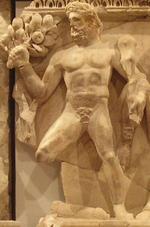
The Apples
11. The golden apples of the Hesperides. This was particularly difficult, since Heracles did not know where to find them.
They were the apples which Hera had received at her wedding from Ge, and which she had entrusted to the keeping of the Hesperides and the dragon Lad on on Mount Atlas, in the country of the Hyperboreans.
In other accounts the apples are described as sacred to Aphrodite, Dionysus, or Helios but the abode of the Hesperides is placed by Hesiod, Apollodorus, and others, in the west, while later writers specify more particularly certain places in Libya, or in the Atlantic Ocean.
The mention of the Hyperboreans in this connection renders the matter very difficult, but it is possible that the ancients may have conceived the extreme north (the usual seat of the Hyperboreans), and the extreme west to be contiguous.
Heracles, in order to find the gardens of the Hesperides, went to the river Echedorus, in Macedonia, after having killed Termerus in Thessaly. In Macedonia he killed Cycnus, the son of Ares and Pyrene, who had challenged him. He thence passed through Illyria, iand arrived on the banks of the river Eridanus, and was informed by the nymphs in what manner he might compel the prophetic Nereus to instruct him as to what road he should take.
On the advice of Nereus he proceeded to Libya. Apollodorus as signs the fight with Antaeus, and the murder of Busiris, to this expedition both Apollodorus and Diodorus now make Heracles travel further south and east: thus we find him in Ethiopia, where lie kills Emathion, in Arabia, and in Asia he advances as far as Mount Caucasus, where he killed the vulture which consumed the liver of Prometheus and thus saved the Titan.
At length Heracles arrived at Mount Atlas, among the Hyperboreans. Prometheus had advised him not to fetch the apples himself, but to send Atlas, and in the meantime to carry the weight of heaven for him. Atlas accordingly fetched the apples, but on his return he refused to take the burden of heaven on his shoulders again, and declared that he himself would carry the apples to Eurystheus. Heracles, however, contrived by a stratagem to get the apples and hastened away.
On his return Eurystheus made him a present of the apples, but Heracles dedicated them to Athena, who, however, did not keep them, but restored them to their former place.
Some traditions add to this account that Heracles killed the dragon Ladon.
12. Cerberus. To fetch this monster from the lower world is the crown of the twelve labours of Heracles, and is therefore usually reckoned as the twelfth or last in the series. It is the only one that is expressly mentioned in the Homeric poems.
Later writers have added to the simple story several particulars, such, e. g. that Heracles, previous to setting out on his expedition, was initiated by Eumolpus in the Eleusiriian mysteries, in order to purify him from the murder of the Centaurs.
Accompanied by Hermes and Athena, Heracles descended into Hades, near Cape Taenarum, in Laconia. On his arrival most of the shades fled before him, and he found only Meleager and Medusa, with whom he intended to fight but, on the command of Hermes, he left them in peace.
Near the gates of Hades he met Theseus and Peirithous, who stretched their arms imploringly towards him. He delivered Theseus, but, when he attempted to do the same for Peirithousi the earth began to tremble.
After having rolled the stone from Ascalaphus, he killed one of the oxen of Hades, in order to give the shades the blood to drink, and fought with Menoetius, the herdsman. Upon this, he asked Pluto permission to take Cerberus, and the request was granted, on condition of its being done without force of arms. This was accomplished, for Heracles found Cerberus on the Acheron, and, notwithstanding the bites of the dragon, he took the monster, and in the neighbourhood of Troezene he brought it to the upper world.
The place where he appeared with Cerberus is not the same in all traditions, for some say that it was at Taenarum, others at Hermione, or Coroneia, and others again at Heracleia. When Cerberus appeared in the upper world, it is said that, unable to bear the light, he spit, and this called forth the poisonous plant called aconitum. After having shown the monster to Eurystheus, Heracles took it back to the lower world.
Some traditions connect the descent of Heracles into the lower world with a contest with Hades, as we see even in the Iliad (v. 397), and more particularly in the Alcestis of Euripides.
Such is the account of the twelve labours of Heracles. According to Apollodorus, Eurystheus originally required only ten, and commanded him to perform two more, because he was dissatisfied with two of them but Diodorus represents twelve as the original number required. Along with these labours the ancients relate a considerable number of other labours being commanded by Eurystheus and others belong to a later period.
Those of the former kind have already been noticed above and we now proceed to mention the principals of the second class.
After the accomplishment of the twelve labours, and being released from the servitude of Eurystheus, he returned to Thebes. He there gave Megara in marriage to Lolaus for, as he had lost the children whom he had by her, he looked upon his connection with her as displeasing to the gods and went to Oechalia.
According to some traditions, Heracles, after his return from Hades, was seized with madness, in which he killed both Megara and her children. This madness was a calamity sent to him by Hera, because he had slain Lycus, king of Thebes, who, in the belief that Heracles would not return from Hades, had attempted to murder Megara and her children. Eurytus, king of Oechalia, an excellent archer, and the teacher of Heracles in his art, had promised his daughter Lole to the man who should excel him and his sons in using the bow.
Heracles engaged in the contest with them and succeeded, but Eurytus refused abiding by his promise, saying, that he would not give his daughter to a man who had murdered his own children. Iphitus, the son of Eurytus, endeavoured to persuade his father, but in vain.
Soon after this the oxen of Eurytus were carried off, and it was suspected that Heracles was the offender. Iphitus again defended Heracles, went to him and requested his assistance in searching after the oxen. Heracles agreed but when the two had arrived at Tiryns, Heracles, in a fit of madness, threw his friend down from the wall, and killed him.
Deiphobus of Amyclae purified Heracles from this murder, but he was, nevertheless, attacked by a severe illness. Heracles then repaired to Delphi to obtain a remedy, but the Pythia refused to answer his questions.
A struggle between Heracles and Apollo ensued, and the combatants were not separated till Zeus sent a flash of lightning between them. Heracles now obtained the oracle that he should be restored to health, if he would sell himself, would serve three years for wages, and surrender his wages to Eurytus, as an atonement for the murder of Iphitus.
Heracles was sold to Omphale, queen of Lydia, and widow of Tmolus.
Late writers, especially the Roman poets, describe Heracles, during his stay with Omphale, as indulging at times in an effeminate life: he span wool, it is said, and sometimes he put on the garments of a woman, while Omphale wore his lion's skin but, according to Apollodorus and Diodorus, he nevertheless performed several great feats. Among these, we mention his chaining the Cercopes [cercopes] his killing Syleus and his daughter in Aulis, his defeat of the plundering Idones, his killing a serpent on the river Sygaris, and his throwing the blood-thirsty Lytierses into the Maeander.
He further gave to the island of Doliche the name of Icaria, as he buried in it the body of Icarus, which had been washed on shore by the waves. He also undertook an expedition to Colchis, which brought him in contact with the Argonauts. He took part in the Calydonian hunt and met Theseus on his fending from Troezene on the Corinthian isthmus. An expedition to India, which was mentioned in some traditions, may likewise be inserted in this place.
When the period of his servitude and his illness had passed away, he undertook an expedition against Troy, with 18 ships and a band of heroes.
On his landing, he entrusted the fleet to Oicles, and with his other companions made an attack upon the city. Laomedon in the mean time made an attack upon the ships, and slew Oicles, but was compelled to retreat into the city, where he was besieged.
Telamon was the first who forced his way into the city, which roused the jealousy of Heracles to such a degree that he determined to kill him but Telamon quickly collected a heap of stones, and pretended that he was building an altar to Heracles. This soothed the anger of the hero and after the sons of Laomedon had fallen, Heracles gave to Telamon Hesione, as a reward for his bravery.
On his return from Troy, Hera sent a storm to impede his voyage, which compelled him to land in the island of Cos. The Meropes, the inhabitants of the island, took him for a pirate, and received him with a shower of stones but during the night he took possession of the island, and killed the king, Eurypylus.
Heracles himself was wounded by Chalcodon, but was saved by Zeus. After he had ravaged Cos, he went, by the command of Athena, to Phlegra, and fought against the Gigantes.
Respecting his fight against the giants, who were, according to an oracle, to be conquered by a mortal, see especially Euripides. Among the giants defeated by him we find mention of Alcyoneus, a name borne by two among them.
Soon after his return to Argos, Heracles marched against Augeas to chastise him for his breach of promise (see above), and then proceeded to Pylos, which he took, and killed Perictymenus, a son of Neleus. He then advanced against Lacedaemon, to punish the sons of Hippocoon, for having assisted Neleus and slain Oeonus, the son of Licymnius. Heracles took Lacedaemon, and assigned the government of it to Tyndareus.
On his return to Tegea, he became, by Auge, the father of Telephus and then proceeded to Calydon, where he demanded Deianeira, the daughter of Oeneus, for his wife. [deianeira achelous].
The adventures which now follow are of minor importance, such as the expedition against the Dryopians, and the assistance he gave to Aegimius, king of the Dorians, against the Lapithae but as these events led to his catastrophe, it is necessary to subjoin a sketch of them.
Heracles had been married to Deianeira for nearly three years, when, at a repast in the house of Oeneus, he killed, by an accident, the boy Eunomus, the son of Architeles. The father of the boy pardoned the murder, as it had not been committed intentionally but Heracles, in accordance with the law, went into exile with his wife Deianeira. On their road they came to the river Euenus, across which the centaur Nessus used to carry travellers for a small sum of money.
Heracles himself forded the river, and gave Deianeira to Nessus to carry her across. Nessus attempted to outrage her: Heracles heard her screaming, and as the centaur brought her to the other side, Heracles shot an arrow into his heart. The dying centaur called out to Deianeira to take his blood with her, as it was a sure means for preserving the love of her husband.
From the river Euenus, Heracles now proceeded through the country of the Dryopes, where he showed himself worthy of the epithet the voracious, which is so often given to him, especially by late writers, for in his hunger he took one of the oxen of Theiodamas, and consumed it all.
TO HERACLES THE LION-HEARTED
I will sing of Heracles, the son of Zeus and much the mightiest of men on earth. Alcmena bare him in Thebes, the city of lovely dances, when the dark-clouded Son of Cronos had lain with her. Once he used to wander over unmeasured tracts of land and sea at the bidding of King Eurystheus, and himself did many deeds of violence and endured many; but now he lives happily in the glorious home of snowy Olympus, and has neat-ankled Hebe for his wife.
Hail, lord, son of Zeus! Give me success and prosperity.
From the Homeric Hymns
At last he arrived in Trachis, where he was kindly received by Ceyx, and conquered the Dryopes. He then assisted Aegimius, king of the Dorians, against the Lapithae, and without accepting a portion of the country which was offered to him as a reward. Laogoras, the king of the Dryopes, and his children, were slain.
As Heracles proceeded to Iton, in Thessaly, he was challenged to single combat by Cycnus, a son of Ares and Pelopia but Cycnus was slain. King Amyntor of Ormenion refused to allow Heracles to pass through his dominions, but had to pay for his presumption with his life.
Heracles now returned to Trachis, and there collected an army to take vengeance on Eurytus of Oechalia. Apollodorus and Diodorus agree in making Heracles spend the last years of his life at Trachis, but Sophocles represents the matter in a very different light, for, according to him, Heracles was absent from Trachis upwards of fifteen months without Deianeira knowing where he was.
During that period he was staying with Qmphale in Lydia and without returning home, he proceeded from Lydia at once to Oechalia, to gain possession of Lole, whom he loved. With the assistance of his allies, Heracles took the town of Oechalia, and slew Eurytus and his sons, but carried his daughter Lole with him as a prisoner.
On his return home he landed at Cenaeum, a promontory of Euboea, and erected an altar to Zeus Cenaeus, and sent his companion, Lichas, to Trachis to fetch him a white garment, which he intended to use during the sacrifice. Deianeira, who heard from Lichas respecting Lole, began to fear lest she should supplant her in the affection of her husband, to prevent which she steeped the white garment he had demanded in the preparation she had made from the blood of Nessus.
Scarcely had the garment become warm on the body of Heracles, when the poison which was contained in the ointment, and had come into it from the poisoned arrow with which Heracles had killed Nessus, penetrated into all parts of his body, and caused him the most fearful pains. Heracles seized Lichas by his feet, and threw him into the sea. He wrenched off his garment, but it stuck to his flesh, and with it he tore whole pieces from his body. In this state he was conveyed to Trachis. Deianeira, on seeing what she had unwittingly done, hung herself and Heracles commanded Hylhis, his eldest son, by Deianeira, to marry Lole as soon as he should arrive at the age of manhood.
He then ascended Mount Oeta, raised a pile of wood, ascended, and ordered it to be set on fire. No one ventured to obey him, until at length Poeas the shepherd, who passed by, was prevailed upon to comply with the desire of the suffering hero. When the pile was burning, a cloud came down from heaven, and amid peals of thunder carried him into Olympus, where he was honoured with immortality, became reconciled with Hera, and married her daughter Hebe, by whom he became the father of Alexiares and Anicetus.
The wives and children of Heracles are enumerated by Apollodorus , but we must refer the reader to the separate articles. We may, however, observe that among the very great number of his children, there are no daughters, and that Euripides is the only writer who mentions Macaria as a daughter of Heracles by Deianeira.
We must also pass over the long series of his surnames, and proceed to give an account of his worship in Greece.
Immediately after the apotheosis of Heracles, his friends who were present at the termination of his earthly career offered sacrifices to him as a hero and Menoetius established at Opus the worship of Heracles as a hero.
This example was followed by the Thebans, until at length Heracles was worshipped throughout Greece as a divinity but he, Dionysus and Pan, were regarded as the youngest gods, and his worship was practised in two ways, for he was worshipped both as a god and as a hero.
One of the most ancient temples of Heracles in Greece was that at Bura, in Aclmia, where he had a peculiar oracle. In the neighbourhood of Thermopylae, where Athena, to please him, had called forth the hot spring, there was an altar of Heracles and it should be observed that hot springs in general were sacred to Heracles. In Phocis he had a temple and as at Rome, women were not allowed to take part in his worship, probably on account of his having been poisoned by Deianeira.
But temples and sanctuaries of Heracles existed in all parts of Greece, especially in those inhabited by the Dorians. The sacrifices offered to him consisted principally of bulls, boars, rams and lambs.
The worship of Hercules at Rome and in Italy requires a separate consideration. His worship there is connected by late, especially Roman writers, with the hero's expedition to fetch the oxen of Geryones and the principal points are, that Hercules in the West abolished human sacrifices among the Sabines, established the worship of fire, and slew Cacus, a robber, who had stolen eight of his oxen.
The aborigines, and especially Evander, honoured the hero with divine worship. Hercules, in return, feasted the people, and presented the king with lands, requesting that sacrifices should be offered to him every year, according to Greek rites. Two distinguished families, the Potitii and Pinarii, were instructed in these Greek rites, and appointed hereditary managers of the festival. But Hercules made a distinction between these two families, which continued to exist for a long time after for, as Pinarius arrived too late at the repast, the god punished him by declaring that he and his descendants should be excluded for ever from the sacrificial feast.
Thus the custom arose for the Pinarii to act the part of servants at the feast.
The Fabia gens traced its origin to Hercules, and Fauna and Acca Laurentia are called mistresses of Hercules. In this manner the Romans connected their earliest legends with Hercules. It should be observed that in the Italian traditions the hero bore the name of Recaranus, and this Recaranus was afterwards identified with the Greek Heracles. He had two temples at Rome, one was a small round temple of Hercules Victor, or Hercules Triumphalis, between the river and the Circus Maximus, in the forum boarium, and contained a statue, which was dressed in the triumphal robes whenever a general celebrated a triumph. In front of this statue was the ara maxima, on which, after a triumph, the tenth of the booty was deposited for distribution among the citizens.
The second temple stood near the porta trigemina, and contained a bronze statue and the altar on which Hercules himself was believed to have once offered a sacrifice. Here the city praetor offered every year a young cow, which was consumed by the people within the sanctuary. The Roman Hercules was regarded as the giver of health.
At Rome he was further connected with the Muses, whence he is called Musagetes, and was represented with a lyre, of which there is no trace in Greece. The identity of the Italian with the Greek Heracles is attested not only by the resemblance in the traditions and the mode of worship, but by the distinct belief of. the Romans themselves.
The Greek colonies had introduced his worship into Italy, and it was thence carried to Rome, into Gaul, Spain, and even Germany. But it is, nevertheless, in the highest degree probable that the Greek mythus was engrafted upon, or supplied the place of that about the Italian Recaranus or Garanus.
The works of art in which Heracles was represented were extremely numerous, and of the greatest variety, for he was represented at all the various stages of his life, from the cradle to his death but whether he appears as a child, a youth, a struggling hero, or as the immortal inhabitant of Olympus, his character is always that of heroic strength and energy. Specimens of every kind are still extant, In the works of the archaic style he appeared as a man with heavy armour but he is usually represented armed with a club, a Scythian bow, and a lion's skin.
His head and eyes are small in proportion to the other parts of his body his hair is short, bristly, and curly, his neck short, fat, and resembling that of a bull the lower part of his forehead projects, and his expression is grave and serious his shoulders, arms, breast, and legs display the highest physical strength, and the strong muscles suggest the unceasing and extraordinary exertions by which his life is characterised.
The representations of Heracles by Myron and Parrhasius approached nearest to the ideal which was at length produced by Lysippus. The so-called Farnesian Heracles, of which the torso still exists, is the work of Glycon, in imitation of one by Lysippus. It is the finest representation of the hero that has come down to us: he is resting, leaning on his right arm, while the left one is reclining on his head, and the whole figure is a most exquisite combination of peculiar softness with the greatest strength.
The mythus of Heracles, as it has come down to us, has unquestionably been developed on Grecian soil his name is Greek, and the substance of the fables also is of genuine Greek growth: the foreign additions which at a later age may have been incorporated with the Greek mythus can easily be recognised and separated from it. It is further clear that real historical elements are interwoven with the fables.
The best treatises on the mythus of Heracles are those of Buttmani and C. 0. Muller, both of whom regard the hero as a purely Greek, character, though the former considers him as entirely a poetical creation, and the latter believes that the whole mythus arose from the proud consciousness of power which is innate in every man, by means of which he is able to raise himself to an equality with the immortal gods, notwithstanding all the obstacles that may be placed in his way.
Before we conclude, we must add a few remarks respecting the Heracles of the East, and of the Celtic and Germanic nations. The ancients themselves expressly mention several heroes of the name of Heracles, who occur among the principal nations of the ancient world, Diodorus, speaks of three, the most ancient of whom was Egyptian, a son of Zeus, the second a Cretan, one of the Dactyls, and the third or youngest was Heracles the son of Zeus by Alcmena, who lived shortly before the Trojan war, and to whom the feats of the earlier ones were ascribed. Cicero counts six heroes of this name, and he likewise makes the last and youngest the son of Zeus and Alcmena. Varro is said to have reckoned up forty-four heroes of this name, while Servius assumes only four, viz. the Tirynthian, the Argive, the Theban, and the Libyan Heracles.
Herodotus tells us that he made inquiries respecting Heracles: the Egyptian he found to be decidedly older than the Greek one but the Egyptians referred him to Phoenicia as the original source of the traditions. The Egyptian Heracles, who is mentioned by many other writers besides Herodotus and Diodorus, is said to have been called by his Egyptian name Som or Dsom, or, according to others, Chon and, according to Pausanias, Maceris. According to Diodorus Som was a son of Amon (Zeus) but Cicero calls him a son of Nilus, while, according to Ptolemaeus Hephaestion, Heracles himself was originally called Nilus.
This Egyptian Heracles was placed by the Egyptians in the second of the series of the evolutions of their gods. The Thebans placed him 17,000 years before king Amasis, and, according to Diodorus, 10,000 years before the Trojan war whereas Macrobius states that he had no beginning at all.
The Greek Heracles, according to Diodorus, became the heir of all the feats and exploits of his elder Egyptian namesake. The Egyptian Heracles, however, is also mentioned in the second class of the kings so that the original divinity, by a process of anthropomorphism, appears as a man, and in this capacity he bears great resemblance to the Greek hero. This may, indeed, be a mere reflex of the Greek traditions, but the statement that Osiris, previous to his great expedition, entrusted Heracles with the government of Egypt, seems to be a genuine Egyptian legend.
The other stories related about the Egyptian Heracles are of a mysterious nature, and unintelligible, but the great veneration in which he was held is attested by several authorities. Further traces of the worship of Heracles appear in Thasus, where Herodotus found a temple, said to have been built by the Phoenicians sent out in search of Europa, five generations previous to the time of the Greek Heracles. He was worshipped there principally in the character of a saviour.
The Cretan Heracles, one of the Idaean Dactyls, was believed to have founded the temple of Zeus at Olympia but to have originally come from Egypt. The traditions about him resemble those of the Greek Heracles but it is said that he lived at a much earlier period than the Greek hero, and that the latter only imitated him. Eusebius states that his name was Diodas, and Hieronymus makes it Desanaus. He was worshipped with funeral sacrifices, and was regarded as a magician, like other ancient daemones of Crete.
In India, also, we find a Heracles, who was called by the unintelligible name Atpcrdvris. The later Greeks believed that he was their Own hero who had visited India, and related that in India he became the father of many sons and daughters by Pandaea, and the ancestral hero of the Indian kings.
The Phoenician Heracles, whom the Egyptians considered to be more ancient than their own, was probably identical with the Egyptian or Libyan Heracles. He was worshipped in all the Phoenician colonies, such as Carthage and Gades, down to the time of Constantine, and it is said that children were sacrificed to him.
The Celtic and Germanic Heracles has already been noticed
above, as the founder of Alesia, Nemausus, and the author of the
Celtic race. We become acquainted with him in the accounts of the
expedition of the Greek Heracles to Geryones. We must either
suppose that the Greek Heracles was identified with native heroes
of those northern countries, or that the notions about Heracles
had been introduced there from the East.
